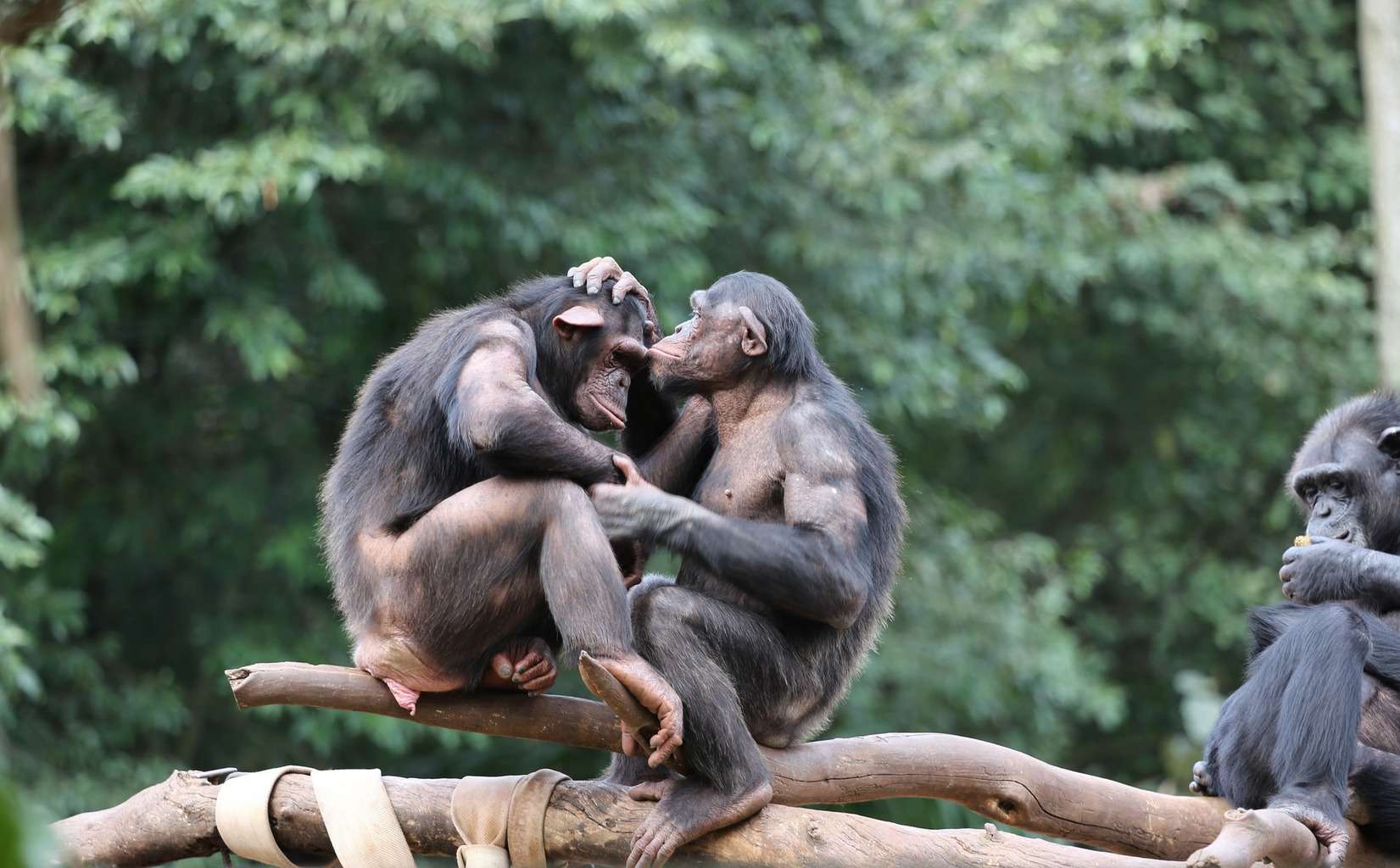In 2005, Drs. Felix Warnecken and Michael Tomasello conducted a study on altruism in human infants and chimpanzees.1 Altruism is taking action to help someone else, even when that action won’t be reciprocated or otherwise benefit oneself. To put it simply, altruistic actions are motivated purely by the desire to help another. Altruistic behaviour arises early in human development: In this particular study, 18-month-old humans were eager to help an experimenter in a variety of situations. Evolutionarily speaking, however, altruism towards non-kin is rare and some researchers have characterized it as uniquely human. Therefore, one of the research goals of this study was to determine whether chimpanzees – our closest evolutionary relatives – would demonstrate altruistic behaviour towards non-kin.
To test this, they confronted three chimpanzees with different situations in which a familiar human was in need of help:
- An object was out of reach
- A physical obstacle prevented an action from taking place – e.g. a closed cabinet didn’t allow the placement of books inside the cabinet
- An action produced an undesired result – e.g. a book was placed on top of a stack but slipped off
- Wrong means were used to achieve a goal – e.g. a spoon dropped into a box and the experimenter tried to grasp it through a small hole instead of using a flap
While the 18-month-old infants helped in each of the four types of situations, the chimpanzees did so only in situation #1. After an average time of 13 seconds, they took the object that the experimenter was trying to reach and gave it to him. This instrumental helping behaviour shows that chimpanzees are indeed capable of altruism towards non-kin. As to why the chimpanzees did not help in the three other types of situations, the researchers suggest a cognitive instead of a motivational explanation: While the chimpanzees might normally be motivated to help, they did not recognize that help was required in those situations. This would be in line with the fact that unsuccessful reaching in situation #1 is a clear indicator that assistance is needed – which may have not been as obvious in the other situations.
But even from a cognitive perspective, the mere fact that instrumental helping occurred at all is remarkable because it implies that the primates are able to understand that other beings have goals. This is an important aspect of a so-called “theory of mind”, which psychologists termed the ability to understand that oneself – and most importantly others – have mental states such as beliefs, intentions and goals, as well as unique subjective perspectives of the world. While chimpanzees don’t seem to demonstrate a human-level theory of mind, this and other studies have shown that they can understand that other beings have goals, intentions, knowledge and perception.2
While this study looked at altruism in an experimental design, observational studies have also shown that primates demonstrate reciprocal altruism in more natural settings: Grooming, tolerance, and food sharing are low-cost altruistic behaviours that primates frequently show, even without expecting reciprocation in the short-term.3 The authors suggest, however, that long-term reciprocity does take place and that “emotional bookkeeping” – an emotion-based system to keep track of altruistic behaviour exchanged with other individuals – is at the foundation of this phenomenon.
Therefore, it can be concluded that our closest evolutionary relatives probably do possess the ability and the motivation to show altruistic behaviour – just as we do.
Chimp AltruismIn 2005, Drs. Felix Warnecken and Michael Tomasello conducted a study on altruism in human infants and chimpanzees.1 Altruism is taking action to help someone else, even when that action won’t be reciprocated or otherwise benefit oneself.
To put it simply, altruistic actions are motivated purely by the desire to help another. Altruistic behaviour arises early in human development: In this particular study, 18-month-old humans were eager to help an experimenter in a variety of situations.
Evolutionarily speaking, however, altruism towards non-kin is rare and some researchers have characterized it as uniquely human. Therefore, one of the research goals of this study was to determine whether chimpanzees – our closest evolutionary relatives – would demonstrate altruistic behaviour towards non-kin.
Posted by Animal Cognition on Wednesday, June 8, 2016
This is a guest post written by Niclas Kuper, a psychology student from the University of Hamburg.
Sources:
1 – Warneken F., Tomasello M.
Altruistic helping in human infants and young chimpanzees
Science
http://citeseerx.ist.psu.edu/viewdoc/download?doi=10.1.1.627.9645&rep=rep1&type=pdf
2 – Call J., Tomasello M.
Does the chimpanzee have a theory of mind? 30 years later.
Trends in cognitive sciences
http://www.eva.mpg.de/psycho/pdf/Publications_2008_PDF/Call_Tomasello_2008.pdf
3 – Schino G., Aureli F.
Reciprocal altruism in primates: partner choice, cognition, and emotions.
Advances in the Study of Behavior
https://www.researchgate.net/publication/222298582_Chapter_2_Reciprocal_Altruism_in_Primates_Partner_Choice_Cognition_and_Emotions



This kind of altruism is not only directed to non-kin individuals but to individuals from other species. This is the huge leap to jump in my opinion.